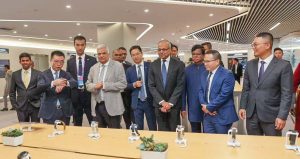Sri Lankan President Ranil Wickremesinghe, who was in Beijing to participate in the third Belt and Road Initiative (BRI) International Forum, has raised eyebrows in Sri Lankan political and diplomatic circles.
During the visit, an agreement “formalizing Huawei’s support for the digitization of Sri Lankan schools” was signed.
On October 17, the Sri Lankan president visited Huawei’s research and development center, where he spoke of the significant role the Chinese government and Huawei can play in bolstering Sri Lanka’s digital education system and advancing green energy initiatives. He highlighted his government’s ongoing efforts in transitioning toward a digital and environmentally sustainable economy.
Huawei’s Senior Vice President Simon Lin expressed readiness to support an annual program aimed at nurturing software and hardware engineers in Sri Lanka. Huawei has already initiated collaborations with several Sri Lankan universities, not only in academic assistance but also in providing technology and infrastructure, he said.
Sri Lanka’s agreement with Huawei elicited surprise in Colombo as its deal with Huawei will not go down well with Washington.
The United States considers Huawei and Semiconductor Manufacturing International Corporation (SMIC) as threats to its national security as they threaten U.S. dominance in semiconductor technology.
In 2019 and 2020, the U.S. imposed trade restrictions on Huawei and SMIC to effectively exclude Huawei from the 5G market. The sanctions were to restrict Huawei’s access to U.S. semiconductor technology, especially chips, chip design software, and chipmaking equipment. Subsequently, American suppliers have been required to secure a special license to deliver goods to these companies.
SMIC, China’s leading semiconductor manufacturer, faces restrictions in acquiring Extreme Ultraviolet (EUV) machines essential for producing cutting-edge microchips, as these machines are exclusively provided by the Dutch company ASML.
Nevertheless, Huawei made a comeback to the 5G smartphone market with the launch of its Mate60 Pro, overcoming years of increasingly stringent export controls imposed by the U.S. Department of Commerce. The new chips for the smartphone were produced by SMIC using advanced 7-nanometer (nm) technology (referred to as N+2 in SMIC’s process nomenclature), prompting concerns within U.S. national security circles about the potential erosion of the effectiveness of U.S. technology export controls on Huawei and, possibly, China as a whole.
In response, among other things, Republican legislators in the United States are advocating for more stringent sanctions against Huawei and SMIC.
Widely perceived as a pro-U.S. politician, Wickremesinghe has not only permitted the ongoing collaborations between Huawei and Sri Lankan institutes of higher education but also has extended an invitation for Huawei to participate in the country’s school systems. This move is arguably viewed as a challenge to Western interests and alignments.
On the other hand, Wickremesinghe is acting in line with Sri Lanka’s interests. Most Sri Lankan schools do not have even a single computer and the country desperately needs significant investment to digitize classrooms. Where will this money come from?
Unfolding developments are reminiscent of the 2015-2019 period, when Wickremesinghe served as prime minister. The administration was initially perceived as pro-Western, with expectations that the West would extend crucial assistance that Sri Lanka needed. However, substantial aid did not materialize from Western sources, prompting the government to shift its focus to seek support from China.
Assuming office in mid-2022 amidst Sri Lanka’s most severe economic crisis since gaining independence, Wickremesinghe’s affiliations with the West possibly played a role in Sri Lanka securing assistance from the IMF.
However, substantial aid or investments, crucial for kickstarting the stagnant economy have been lacking. The Wickremesinghe government has pinpointed digitization, a green economy, agricultural modernization, and logistics as pivotal drivers for the nation’s future development. To implement these strategies, substantial financial inflows in the billions are imperative, and it appears that such resources are not coming from Western sources.
While India’s generosity in 2022 has been noted, it comes with perceived encumbrances that many Sri Lankans view as unwarranted interference in their sovereignty. In this context, the timing seems opportune for Beijing to reestablish its influence, less than a year after triumphalist editorials claimed that China had been replaced as Sri Lanka’s key partner.
As Sri Lanka navigates this geopolitical recalibration, the coming months will reveal the extent of China’s renewed influence in the country’s economic and developmental landscape. Wickremesinghe’s strategic choices, despite their divisive nature, reflect a pragmatic response to immediate challenges, with implications that reach far beyond the duration of his official visit to Beijing.

































